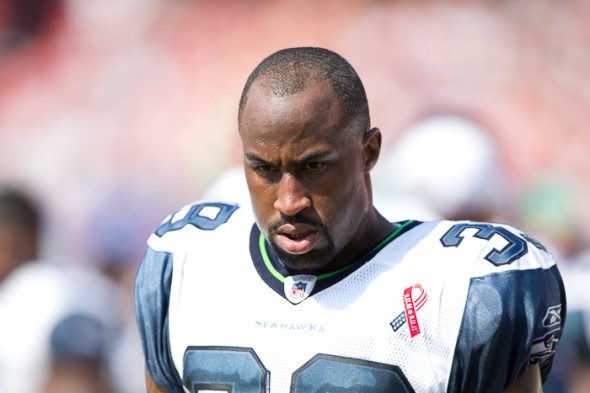
Absent the past two games with a groin injury, Seahawks CB Brandon Browner unexpectedly was available to practice Wednesday, but his health status and rules status remained unclear. Browner is appealing a one-year suspension issued by the NFL for violating the league’s substance-abuse policy. Reportedly, Browner tested positive for a small amount of marijuana.
Seahawks coach Pete Carroll wasn’t sure if Browner will be available for Sunday’s game against the 49ers (1:25 PT, FOX) and didn’t offer a timetable for the league ruling on his future. Browner is an unrestricted free agent at the end of the season, and wasn’t expected to return to the practice field so soon from injury.
“I don’t know,” Carroll said. “We have no control over it. We don’t have any timeline. We don’t know anything. We’re just waiting to get him ready. He’s healthy enough to get back on the field some. We’ll see how it goes.”
Multiple reports indicated the NFL moved Browner to stage 3 of its substance-abuse program after he missed numerous tests from 2006-07 while playing in the CFL. Browner, meanwhile, claims he never received the league’s requests to submit to tests after the Broncos released him in July 2006.
ESPN reporter John Clayton said Tuesday that Browner will take his case to federal court if the league suspends him.
“I think he has been offered one deal, and has turned it down,” Clayton said on 710 ESPN radio. “The one year (suspension), I think, is going to be off the table. But I don’t think he settles for anything less than a four-paycheck, no-suspension type of arrangement. If not, I think he takes it to federal court. I think he feels very good about his case.”
Carroll seemed genuinely surprised that Browner healed so quickly.
“He had a significant groin tear,” Carroll said. “He managed it really well and it was in a place he could go and recover quickly. He’s come back much faster than we thought. We thought he was out a solid six weeks when it happened.”
The Seahawks feel good about their secondary without Browner and defensive back Walter Thurmond, who served Monday the first of a four-game suspension for violating NFL’s substance-abuse policy.
In Monday’s 34-7 win over the Saints, backup cornerback Byron Maxwell and backup nickel corner Jeremy Lane helped the defense hold Saints quarterback Drew Brees to 147 passing yards, a touchdown and an interception.
According to ESPN Stats and Information, Brees didn’t complete a pass for 15 yards or longer for the first time since 2006.
“I was thrilled. (Byron Maxwell) played great,” Carroll said. “He played terrific football. Everything we asked him to do he was on top and in charge and confident . . . he tackled well. Jeremy Lane played very well in the slot, and the nickel spot, for his first time really getting a lot of duty there.”
Russell Wilson earns honor
Completing 22 of 30 passes for 310 yards and three touchdowns and leading the Seahawks in rushing (47 yards) Monday against the Saints earned Russell Wilson NFC offensive player of the week Wednesday.
The second year quarterback is also being mentioned as a frontrunner for NFL MVP.
Harvin questionable
Seahawks wide receiver Percy Harvin won’t practice Wednesday but does plan to do some running, Carroll said. Harvin missed the Saints game after his hip last weekend worsened to the point he required a cortisone shot to subdue inflammation.

2 Comments
I wouldn’t feel too cocky if I was Browner. The NFL has the legal authority to set its own rules and punishments regarding controlled and/or banned substances and that’s an area Browner has had his problems with in the past. Plus, I think federal courts have more important things on their dockets than hearing whether some repeat offender football player should keep his job after violating his employers’ drug policy…again.
I wouldn’t be too sure. As I understand this, it’s about Browner not doing NFL drug tests while playing Canada. The NFL will be thinking big picture here. Their right to dictate to athletes not under contract to them will be called into question. If they lose they’ll lose a lot of their ability to control free agents and waived players. They get away with it now because it’s never been tested in court. The NFL may want to avoid that test.